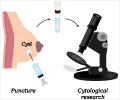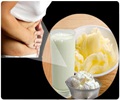Scientists have expressed hope that producing human breast milk substitutes may be a reality soon after successful milking trials in mice.
This is the first time that mice have been genetically modified to produce lactoferrin by splicing human genes into their genome.The ultimate aim of the Russian team behind this work, and of similar research projects in other countries, is to extract lactoferrin from the milk and use the protein to create healthier baby formula.
"Mouse milk is very protein-rich, and this can also translate into very high concentrations of transgenic protein," National Geographic News quoted Patrick van Berkel, a senior director at the Danish biotech company Genmab, writing in an email.
Breastfeeding mothers typically produce 4 to 5 grams of lactoferrin per litre of milk.
Team member Elena Sadchikova, of the Institute of Gene Biology at the Russian Academy of Sciences in Moscow, revealed that the genetically modified mice churned out maximum concentrations equal to 160 grams per litre.
The researcher, however, warned that the finding should not be taken to mean that the mice themselves were about to become biotech dairy animals.
Advertisement
Van Berkel said if attempted commercially, "the scale at which this would have to happen would be a logistic and technical nightmare."
Advertisement
Netherlands-based biotech company Pharming is already commercially milking rabbits bred with human genes.
The rabbit milk contains a human protein used in a new drug treatment for hereditary angioedema, a rare blood disorder that can lead to severe swelling of body tissues.
"When you make a medicine, the volumes [of protein] you need are relatively limited. Whereas if you're going to make human lactoferrin, which eventually you want to use, say, in infant formula, then you need very significant volumes," said Pharming CEO Sijmen de Vries.
De Vries reckons that human lactoferrin from cow milk may be available for commercial use in two to three years.
The Russian team from the Institute of Gene Biology's Sadchikova, however, favour transgenic goats.
"The most attractive advantage of a goat is that its pregnancy period is twice (as short as) that of a cow," the researchers said, which means a herd could be established fairly quickly.
"A goat also reaches breeding age three times faster than a cow ... has good resistance to illnesses, and does not share any diseases with a human being," they add.
Source-ANI
RAS














